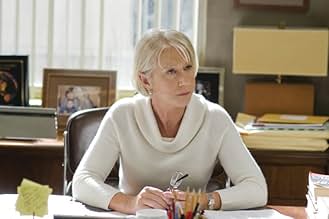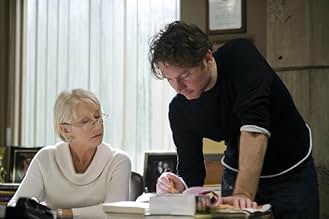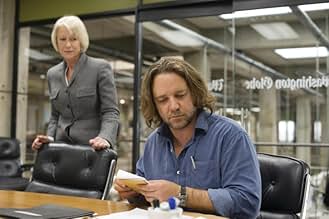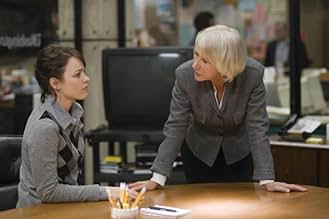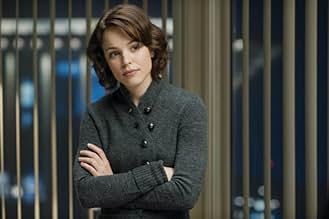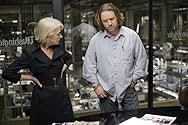Cuando un trabajador del congreso muere asesinado, un periodista de Washington investiga el caso, que envuelve a un congresista con el que fue a la universidad.Cuando un trabajador del congreso muere asesinado, un periodista de Washington investiga el caso, que envuelve a un congresista con el que fue a la universidad.Cuando un trabajador del congreso muere asesinado, un periodista de Washington investiga el caso, que envuelve a un congresista con el que fue a la universidad.
- Dirección
- Guionistas
- Elenco
- Premios
- 2 premios ganados y 4 nominaciones en total
Robin Wright
- Anne Collins
- (as Robin Wright Penn)
Steve Park
- Chris Kawai
- (as Stephen Park)
Opiniones destacadas
I cannot describe how much I enjoy a good investigative reporting story, and State of Play really scratched that itch. It also combines that kind of story-telling with the idea of a few people trying to blow the lid on a massive conspiracy that may put their lives in danger, which is another style of film that I love. I was thrilled through most of State of Play, and didn't even care that there were some predictable aspects to the story, because it's not always about finding out whodunnit but seeing how they will be caught. Russell Crowe delivered his same performance he always gives, but it didn't bother me too much here since I was deeply invested in the plot (although I did find myself wondering how much more I'd enjoy it with a better actor.) The rest of the cast did marvelous work, and helped make the entire film more impactful. I even found Ben Affleck to be a good casting choice (for once) because he has the right kind of smarminess that I'd expect from that kind of politician.
For a long time I was convinced that State of Play was going to be one of those legendary films that ticks all the boxes for me, and would become a favorite I'd watch again and again. However, there were a couple of things that held it back from greatness for me, and left me just a little disappointed at the end. First of all, there was a slight interpersonal relationship dynamic between some of the characters that felt unnecessary and detracted from the story for me in a small way. It wasn't terrible, but it came across as pointless baggage they were adding to the characters that didn't enhance the plot in any way. Finally, there's the ending. While I can't dig into any details without touching on spoilers, I'll just say that it did too much to reframe the entire plot of the film, and created more questions than answers. It genuinely took me to a place where I no longer knew how to feel about the resolution of State of Play. I didn't need that twist, and it left me conflicted about a movie I was loving up to that point.
For a long time I was convinced that State of Play was going to be one of those legendary films that ticks all the boxes for me, and would become a favorite I'd watch again and again. However, there were a couple of things that held it back from greatness for me, and left me just a little disappointed at the end. First of all, there was a slight interpersonal relationship dynamic between some of the characters that felt unnecessary and detracted from the story for me in a small way. It wasn't terrible, but it came across as pointless baggage they were adding to the characters that didn't enhance the plot in any way. Finally, there's the ending. While I can't dig into any details without touching on spoilers, I'll just say that it did too much to reframe the entire plot of the film, and created more questions than answers. It genuinely took me to a place where I no longer knew how to feel about the resolution of State of Play. I didn't need that twist, and it left me conflicted about a movie I was loving up to that point.
In 'State of Play' the surprises keep coming. A politician's staff-member has been murdered and two journalists set out to discover the 'Who' (who killed her) and the 'Why'. We go down one alley, then another, all our beliefs challenged, then changed, but throughout it all our interest remains pretty high.
But then ... then something happens. One of the characters says something that she could not possibly know about, and this re-arranges all the assumptions we have made about guilty parties. Which is fine. But for one thing. The character who made the telling statement all but disappears from the film. She is not guilty. And the someone who is guilty is not the person who made the statement. And so the question is, what really happened here? I don't know. And I should know, because that's what the film was leading up to. Who Done It? Easy. Yes?
Russel Crowe is fine as one journalist, Rachel McAdam is superb as his younger associate. Ben Affleck is his usual stoic self, though it works in this role. Helen Mirren is shrill - too shrill - in her role as the newspaper's managing editor. For fans of Robin Wright - and there are many - she's fine as the wife of the Affleck character; thrown over for someone younger.
Finally, the film is - how to say? - flabby. It's not as tight as it should be. It goes off on tangents that lead nowhere at times when we should be tightening up the script and the tension. Also, it's kind of 'old fashioned'; the sort of plucky-young-journalist film they don't make anymore.
Anyway, it made for an entertaining evening. And that's more than merely O.k.
But then ... then something happens. One of the characters says something that she could not possibly know about, and this re-arranges all the assumptions we have made about guilty parties. Which is fine. But for one thing. The character who made the telling statement all but disappears from the film. She is not guilty. And the someone who is guilty is not the person who made the statement. And so the question is, what really happened here? I don't know. And I should know, because that's what the film was leading up to. Who Done It? Easy. Yes?
Russel Crowe is fine as one journalist, Rachel McAdam is superb as his younger associate. Ben Affleck is his usual stoic self, though it works in this role. Helen Mirren is shrill - too shrill - in her role as the newspaper's managing editor. For fans of Robin Wright - and there are many - she's fine as the wife of the Affleck character; thrown over for someone younger.
Finally, the film is - how to say? - flabby. It's not as tight as it should be. It goes off on tangents that lead nowhere at times when we should be tightening up the script and the tension. Also, it's kind of 'old fashioned'; the sort of plucky-young-journalist film they don't make anymore.
Anyway, it made for an entertaining evening. And that's more than merely O.k.
Good thriller with some excellent performances. Russell Crowe is suitably grizzled as the been around reporter and Helen Mirren is wonderfully tough as his editor, the problem is the casting of Ben Affleck. He gives a good enough performance but is far too young to be believable as Crowe's college roommate or Robin Wright Penn's husband, not his fault but a major casting error nonetheless. Originally Crowe and Affleck's parts were to be filled by Brad Pitt and Edward Norton a far more simpatico pairing the obvious disparity in the leads ages distracts throughout the film. Jason Bateman shows up late in the movie to offer up a fun, out there performance as a sleaze. The story itself does move along and offers some nice tension and twists.
About a month before State of Play came into theaters, I read an article in The Washington Post (I live in the D.C. area) about the realism of the news industry as portrayed in the movie. One of the Post reporters served as a consultant on the set and I must say that he seems to have done his job. Almost every aspect, from the constantly chaotic state of the newsroom to the reporter-lingo, feels authentic and true to reality. While there are occasional times when the movie's main character, the reporter Cal McCaffrey, strays from the usual ethical and professional guidelines, there are logical explanations for such instances that are given in the movie. At one point, Russell Crowe even ad-libs a line about the outdated technology he has compared to the state-of-the-art computers given to Della Fry, Rachel McAdams's gossipy blogger: "I've been here fifteen years, I've got a sixteen year old computer. She's been here fifteen minutes and she's got enough gear to launch a f***ing satellite." This line was inspired by the feud between print journalists and their online counterparts that, according to the Post reporter, exists in real-life. Because journalism is so crucial to the story of State of Play, every minute detail contributes greatly to the believability of the film as a whole and it is this attention to detail that really elevates State of Play above the average political thriller.
The cast, which includes three Oscar winners, though Ben Affleck won for screen writing, could not be more perfect. With his long, shaggy hair, bulging belly and old, trash-littered car, Russell Crowe looks appropriately scruffy and he disappears into his role, becoming one of the most convincing journalists on screen in recent years. It is impossible to imagine anyone else in the role, especially Brad Pitt, who was originally signed on for the part. As his partner on the story, Rachel McAdams delivers, giving her character a very energetic yet idealistic flavor. Della Fry is, at least in the beginning, a rather obnoxious woman but, in large part due to McAdams, she gradually becomes more likable and we learn to accept her for who she is. Helen Mirren is splendid as Cameron, McCaffery and Fry's insistent boss, and every time she appears, the screen comes alive (not that it's dead when she isn't there). Ben Affleck once again proves that he can act when given the right material. He gives his character, a promising congressman, an air of detached arrogance mixed with frustrated vulnerability. Representative Stephen Collins certainly has his principles but throughout the film, that sense of morality is largely shrouded in secrets and mystery and the audience is forced to constantly guess and re-guess his true intentions. Aside from the main actors, the supporting cast does a terrific job with a slightly comedic, almost delightfully over-the-top performance by Jason Bateman as a pretentious PR agent. Also worth noting is Viola Davis, who plays a contact of McCaffrey's in the morgue, and even though she only appears in one scene, she makes the most of that short screen-time that, in turn, makes us remember her well.
Other than the superb cast, one of the most impressive things about State of Play is the script, which was written by Tony Gilroy, Billy Ray and Matthew Michael Carnahan and based on the 2003 BBC mini-series of the same name. However, it bears Tony Gilroy's distinctive mark not only because it involves corporate conspiracies and unending twists, but the witty dialogue could have been written by almost no one else. Occasional instances of humor help lighten the otherwise rather dark mood. Also, the writing is highly intelligent and makes the audience actually think rather than simply go along with the complicated plot. This can also be contributed to the direction of Kevin MacDonald who, after winning an Oscar for his documentary One Day in September in 1999 and directing the Oscar-winning feature film The Last King of Scotland, proves that he has loads of talent and hopefully, will remain prominent in the film-making industry.
Other noteworthy aspects of the movie are the cinematography and the score, both of which help carry the tension throughout the entire two-and-a-half hour film, even during quieter scenes. However, State of Play is not quite perfect. The main, and perhaps only, flaw is the minor plot holes that, while virtually unnoticeable during the actual viewing of the movie, become more obvious upon dissecting the movie afterwards. It is impossible to discuss these errors in detail without giving anything away, but they do make the conclusion a little less satisfying.
Nonetheless, the movie is so good in all other areas that it is still easy to overlook the implausibility of the ending. From the virtually flawless cast and writing to the authenticity of its portrayal of journalists and the thought-provoking political themes, State of Play stands out among all the conventional political thrillers churned out by Hollywood in recent years. Go see it!
The cast, which includes three Oscar winners, though Ben Affleck won for screen writing, could not be more perfect. With his long, shaggy hair, bulging belly and old, trash-littered car, Russell Crowe looks appropriately scruffy and he disappears into his role, becoming one of the most convincing journalists on screen in recent years. It is impossible to imagine anyone else in the role, especially Brad Pitt, who was originally signed on for the part. As his partner on the story, Rachel McAdams delivers, giving her character a very energetic yet idealistic flavor. Della Fry is, at least in the beginning, a rather obnoxious woman but, in large part due to McAdams, she gradually becomes more likable and we learn to accept her for who she is. Helen Mirren is splendid as Cameron, McCaffery and Fry's insistent boss, and every time she appears, the screen comes alive (not that it's dead when she isn't there). Ben Affleck once again proves that he can act when given the right material. He gives his character, a promising congressman, an air of detached arrogance mixed with frustrated vulnerability. Representative Stephen Collins certainly has his principles but throughout the film, that sense of morality is largely shrouded in secrets and mystery and the audience is forced to constantly guess and re-guess his true intentions. Aside from the main actors, the supporting cast does a terrific job with a slightly comedic, almost delightfully over-the-top performance by Jason Bateman as a pretentious PR agent. Also worth noting is Viola Davis, who plays a contact of McCaffrey's in the morgue, and even though she only appears in one scene, she makes the most of that short screen-time that, in turn, makes us remember her well.
Other than the superb cast, one of the most impressive things about State of Play is the script, which was written by Tony Gilroy, Billy Ray and Matthew Michael Carnahan and based on the 2003 BBC mini-series of the same name. However, it bears Tony Gilroy's distinctive mark not only because it involves corporate conspiracies and unending twists, but the witty dialogue could have been written by almost no one else. Occasional instances of humor help lighten the otherwise rather dark mood. Also, the writing is highly intelligent and makes the audience actually think rather than simply go along with the complicated plot. This can also be contributed to the direction of Kevin MacDonald who, after winning an Oscar for his documentary One Day in September in 1999 and directing the Oscar-winning feature film The Last King of Scotland, proves that he has loads of talent and hopefully, will remain prominent in the film-making industry.
Other noteworthy aspects of the movie are the cinematography and the score, both of which help carry the tension throughout the entire two-and-a-half hour film, even during quieter scenes. However, State of Play is not quite perfect. The main, and perhaps only, flaw is the minor plot holes that, while virtually unnoticeable during the actual viewing of the movie, become more obvious upon dissecting the movie afterwards. It is impossible to discuss these errors in detail without giving anything away, but they do make the conclusion a little less satisfying.
Nonetheless, the movie is so good in all other areas that it is still easy to overlook the implausibility of the ending. From the virtually flawless cast and writing to the authenticity of its portrayal of journalists and the thought-provoking political themes, State of Play stands out among all the conventional political thrillers churned out by Hollywood in recent years. Go see it!
I attended a pre-release screening of the new film, State of Play, with anticipation of seeing both quality work from actor Russell Crowe and screenwriter Tony Gilroy. I also entered the theater with a degree of apprehension about how well this feature length film would measure up to the brilliantly acted and crafted six-part BBC series that was the basis for the film. Crowe well-embodied the tenacious old-school investigative journalist that we've come to know from classics, such as "All the President's Men." However, the multifaceted ensemble of journalists, portrayed by a rich range of actors from the BBC series (John Simm, Kelly MacDonald, James McAvoy), is missing from this feature film where Russell Crowe does all the work. The complexity of the plot, which includes the competing professional interests and emotional needs of the characters in the British miniseries, is largely eliminated in this big screen version. Ben Affleck and Robin Wright Penn do not seem to appreciate and respond to the high stakes events that could turn their lives inside out and upside down. What this film shares with the miniseries is the glimpse into the mechanics of running a journalistic investigation under the pressure of time and editorial interference, but the personal stories suffer from not being fleshed out and made to feel real and compelling to watch. It is not fair to compare one piece of art to another, but when two productions are related, and you've seen the original, it is difficult to view the second production without prejudice. It is like trying to unring a bell.
The new film, State of Play, is a convincing thriller, but it fails to also deliver as a richly defined character drama.
Curiosity will drive those who saw the BBC series to see this film, and the rich pedigree of the film production will draw in those who know nothing about the original miniseries. Everyone will ultimately be satisfied by seeing both productions (miniseries is on DVD) so that they can make the comparisons and connections that any thinking film-goer will want to do.
The new film, State of Play, is a convincing thriller, but it fails to also deliver as a richly defined character drama.
Curiosity will drive those who saw the BBC series to see this film, and the rich pedigree of the film production will draw in those who know nothing about the original miniseries. Everyone will ultimately be satisfied by seeing both productions (miniseries is on DVD) so that they can make the comparisons and connections that any thinking film-goer will want to do.
¿Sabías que…?
- TriviaThe scene in which Cal (Russell Crowe) orders lunch, but is then interrupted by his bag getting stolen, was shot at Ben's Chili Bowl, a real Washington, D.C. lunch counter that has been open on U Street NW since 1958.
- ErroresIn the final scene of the printing montage at the end, the sign on the side of the truck says "Washington Post".
- Citas
Cameron Lynne: I want you to do a complete rundown on this Sonia Baker: who she knew, who she blew, the color of her knickers.
- Créditos curiososThe printing process of a newspaper is shown as the ending credits start to show up.
- ConexionesFeatured in Screenwipe: Episode #5.3 (2008)
- Bandas sonorasThe Night Pat Murphy Died
(Traditional)
Arranged by Alan Doyle, Bob Hallett (as Robert Hallett), Séan McCann, Darrell Power
Performed by Great Big Sea
Courtesy of Sonic Entertainment Group and Warner Music Canada Co.
Selecciones populares
Inicia sesión para calificar y agrega a la lista de videos para obtener recomendaciones personalizadas
Detalles
- Fecha de lanzamiento
- Países de origen
- Sitio oficial
- Idiomas
- También se conoce como
- State of Play
- Locaciones de filmación
- Productoras
- Ver más créditos de la compañía en IMDbPro
Taquilla
- Presupuesto
- USD 60,000,000 (estimado)
- Total en EE. UU. y Canadá
- USD 37,017,955
- Fin de semana de estreno en EE. UU. y Canadá
- USD 14,071,280
- 19 abr 2009
- Total a nivel mundial
- USD 87,812,371
- Tiempo de ejecución2 horas 7 minutos
- Color
- Mezcla de sonido
- Relación de aspecto
- 2.35 : 1
Contribuir a esta página
Sugiere una edición o agrega el contenido que falta







